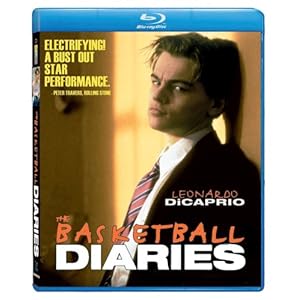

Poetry on film can be a hard sell, but apparently it helps to have Leonardo DiCaprio. In 1995, DiCaprio appeared as Jim Carroll in The Basketball Diaries, then as Arthur Rimbaud in Total Eclipse, and the following year as the sonnet-singing Romeo in William Shakespeare's Romeo + Juliet. When DiCaprio played Carroll, he was hardly an unknown quantity, having already garned top notices for This Boy's Life, The Quick and the Dead and What's Eating Gilbert Grape, for which he received his first Oscar nomination. Still, it was impossible in The Basketball Diaries not to take notice of DiCaprio's seemingly undauntable talent, as he channeled the tortures of the drug-addicted damned.
Carroll's 1978 book collected diaries he wrote between the ages of twelve and sixteen, as he came of age in the 1960s. Scott Kalvert's film (scripted by Bryan Goluboff) unfolds in the early '90s for budgetary reasons, but plays coy about it. Given the Roman Catholic prep school setting and the retro fashions (including Chuck Taylors all around), it's pretty much only the modern cars that suggest the film doesn't take place in the '60s. DiCaprio's Carroll is a promising player on the St. Vitus High School basketball team in New York City who loves the game, and his ma (Lorraine Bracco of Goodfellas), but hates the other adults who have him in their charge: priests who relish beating rebellious students like Jim and a coach (Bruno Kirby) who's always waiting for an opportunity to pounce sexually on one of his players. Though he's a more sensitive soul than he likes to let on—reserving such thoughts and feelings for his diary—Jim spends much of his time playing ball and hanging around with a trio of mooks: bad boy Mickey (Mark Wahlberg), slightly better boy Neutron (Patrick McGaw) and lost boy Pedro (James Madio).
The prospect of playing college ball is the one thing nominally keeping the boys from succumbing to all-out self-destruction. They'll drink, smoke and get high, but they generally have enough self-control to pull back from the abyss. But as he watches his friend Bobby (Michael Imperioli of The Sopranos) waste away from leukemia, Jim's own grip on life weakens. When Jim parties with a girl who offers him cocaine, the heady swirl of depression and the potential for escape through sex and drugs makes the decision an easy one. Jim's artistic temperament makes him a fool for experience, and hard drugs give him body-and-soul-shaking shifts of perception that send him racing to his diary to put it all into words. Cocaine turns out to be a gateway drug to heroin. As Carroll puts it in one of his hard-boiled narrations, "First, it's a Saturday night thing when you feel cool like a gangster or a rockstar—just something to kill the boredom, you know? They call it a chippie, a small habit. It feels so good, you start doing it on Tuesdays. Then Thursdays. Then it's got you. Every wise ass punk on the block says it won't happen to them, but it does."
Kalvert, whose background is in music videos, evokes the dark exhilaration of early days on drugs through striking fantasy sequences, including one in which Jim envisions himself, in a black duster, storming into school and shooting it up with a rifle. As such, the film was dragged into the public debate over the media's possible role in influencing school shootings such as Columbine. While the brief sequence gives potent visual life to intense teenage angst run amok, the film unambiguously condemns violence and drugs, in favor of the positive outlet of art, which offers not escape but an opportunity to process pain. Before salvation, though, Jim must walk through the valley of the shadow of death, and it's a harrowing excursion that leads to wasting away in a drug den and prostituting himself to score (becoming like the neighborhood trollop, played by Juliette Lewis, that he once derided). DiCaprio throws himself into the depiction: sweating, drooling, riding the edge of madness as his helpless mother despairs and an older friend, an ex-addict (Ernie Hudson) from the neighborhood, seizes an opportunity to intervene and save Jim from himself.
You've seen one drug drama, you've seen them all, but if you're going to see one, it might as well be The Basketball Diaries, and preferably at an impressionable age. The film has the benefit of Carroll's tart poetry, DiCaprio's performance holds up, and the strong ensemble (including Wahlberg in only his second big-screen appearance) helps to carry the day.

|
|
 |
Palm Pictures brings The Basketball Diaries onto Blu-ray for an impressive high-def upgrade. The DVD of the film was murky and unconvincing as a representation of the film, but the Blu-ray—despite some mild noise issues and edge enhancement—is a big improvement. Colors are much bolder and truer, detail takes a leap, and the film source is in good shape. Unfortunately, subtitles are not offered, but Palm admirably includes two audio options for a definitive sound presentation: DTS-HD Master Audio 5.1 and LPCM 2.0. Both are well rendered; though the film isn't very sonically dynamic, the music and dialogue and sound effects all come through cleanly and in a nice balance.
Bonus features are limited but nevertheless welcome, all returning from the original DVD. "Interviews with Cast and Crew" (9:40, HD) include the EPK chats with Leonardo DiCaprio, Mark Wahlberg, James Madio, Patrick McGaw, Ernie Hudson, Lorraine Bracco, Bruno Kirby, director Scott Kalvert, and producer Liz Heller. Better yet, there's a 1981 "Jim Carroll Interview & Reading" (6:15, HD) that gives the film some useful context in Carroll's reflections and reading of his poem "Just Visiting."
This off-the-beaten-path title is well worth a look, especially for aficionados of DiCaprio.
 |